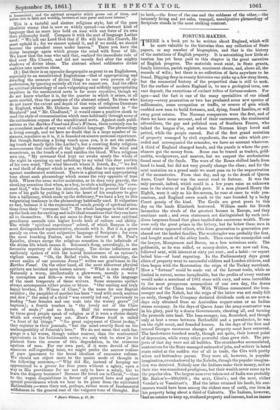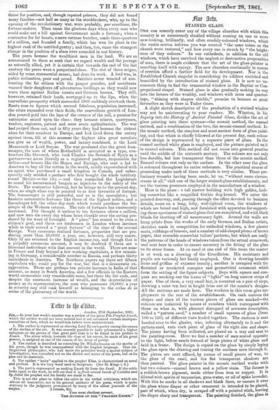FORTUNE-MAKERS.
THERE is a book yet to be written about England, which will be more valuable to the historian than any collection of State papers, or any number of biographies, and that is the history of the mutations of English property. It is astonishing how little at- tention has yet been paid to this chapter in the great narrative of English progress. The materials must exist, in State grants, family histories, parish registers, muniment chests, and, above all, the records of wills ; but there is no collection of facts anywhere to be found. Digging deep in county histories one picks up a few stray items, but the connected history of the propertied class is still to seek. Yet the surface of modem England is, to use a geological term, one vast deposit, the excretions of extinct tribes of fortune-makers. For ages—and the fact is one of the many specialities of our island history—every generation or two has produced some new species of millionaire, some occupation or traffic, or source of gain which enabled new men to build fortunes, and, dying, found families, or will away great estates. The Norman conquerors were the first, and of them we have some account, and of their successors, the continental adventurers, the gay and polished men of Southern France, who talked the langue d'oc, and whom the Norman kings loved and petted, while the people cursed. But of the first grand mutation of property managed by civil expedients, the vast sales which pre- ceded and accompanied the crusades, we have no account whatever. A third of England changed hands, and the puzzle is where the pur- chasers got the money from. Some can be traced as traders, gold- smiths, woolgrowers, and usurers, but we suspect the ecclesiastics found most of the funds. The wars of the Roses shifted lands from hand to hand, but did not very greatly change the class ; and for the next mutation on a grand scale we must pass on to the sequestration of the monasteries. From that day, and up to the death of Queen Anne, Court favour was the surest road to fortune. It was the only pursuit, indeed, which could in a few years raise an unknown man to the status of an English peer. If a man pleased Henry the Eighth, were it only as his fire-screen, he rose at once to wide pos- sessions, and England owes much to the race founded by a lucky Court gossip of the kind. The Cecils are great peers to this day on the lands Elizabeth bestowed. William made his Dutch favourites the rivals of the greatest houses in Europe, and they continue such ; and even statesmen not distinguished by such invi- dious largesses found that place implied also enormous wealth. These were only the great prizes in the lottery, but far below these men in social status appeared others, who from generation to generation pur- chased out the landed families. The woolstapler was probably the first, and bought much of the abbey lands. Then came the monopolist and the lawyer, Mompesson and Bacon, on a less notorious scale. The goldsmith, as he was called, or money-dealer, as we now call him, followed next, with interest at sixty per cent., and a habit—or report belied him—of local regrating. In the Parliamentary days great slices of property went to successful soldiers and London citizens, and then began with the Restoration the reign of the Turkey merchant. How a " fortune" could be made out of the Levant trade, while so limited in extent, seems inexplicable, but the profits of every venture would make a merchant of 1861 stare with envy, and seem incredible to the most prosperous monopolists of our own day, the dozen dictators of the China trade. With William commenced the loan- monger and the Nabob, but the reign of the latter was not really felt so early, though the Company declared dividends such as are nowa- days only obtained from an Australian copper-mine or an Indian steam company. In the days of Queen Anne the army-contractor was in his glory, paid by a dozen Governments, cheating all, and turning the proceeds into land. The loan-monger, too, flourished, and though only at best a cross between Rothschild and a pawnbroker, he was on the right scent, and founded houses. In the days of the first and second Georges enormous changes of property must have occurred. The landowners touched nearly, though not quite, their lowest point of depression, while every other powerful class grew rich. The pro- jects of that day were not all bubbles. The stockbroker accumulated, contractors for the State managed unheard-of jobs, and writers in laced coats railed at the sudden rise of all in trade, the Cits with pretty wives and bottomless purses. They were all, however, in popular imagination,overshadowed by the Nabobs, though the popular imagina- tion was deceived. Nobody saw the Indians make their money, and so their rise was considered prodigious, but their wealth never came up to the popular idea. The largest sum ever taken out of India was probably
Mr. Barlow's-900,000/. ; the next, Clive's ; and the next, either Verelst's or Vansittart's. Had the latter retained his lands, his suc- cessors would have been among the richest men of earth, one itemin his property being about a third of Calcutta. The Indians, however, had no estates to keep np, confused property and income, had an insane
thirst for position, and, though reputed princes, they did not found many families—not half so many as the stockbrokers, who, up to the opening of the revolutionary war, were probably, par excellence, the fortune-makers. Then came the glorious days when every man who could make out a bill against Government made a fortune; when a contractor for fat beasts, a mere carcase butcher, made three-quarters of a million, and founded a family, which has won its place in the highest rank of the untitled gentry; and then, too, came the strangest change in the position of a class ever recorded in our history.
The peers became the wealthiest men in the land. We are so accustomed to them as such that we regard wealth and the peerage as naturally allied, yet it is certain that towards the end of the last century the peers were a pauperized class. The riot of three reigns, aided by some commercial causes, had done its work. A lord was, in public estimation, poor and proud. Satirists never wearied of con- trasting the fat citizen with the pauper grandee, and merchants warned their daughters off adventurous lordlings as they would now warn them against Italian counts and German barons. They still, however, retained their lands, mortgaged up to the lips, when the marvellous prosperity which succeeded 1805 suddenly overtook them. Rents rose to figures which seemed fabulous, population increased, the cities expanded over their fields, the marvellous growth of Lon- don poured gold into the laps of the owners of the soil, a passion for enterprise seized upon the class : they became miners, quarrymen, traders, engineers, patient and most acute agriculturists. The war had purged them out, and in fifty years they had become the richest class for their numbers in Europe, and had lived down the outcry against them, till at this moment the highest idea great novelists can give us of wealth, power, and luxury combined, is the Lord Monmouth or Lord Steyne. The war produced also the great loan- monger, the man of whom Rothschild is accepted as a type, con- tractors like Ouvrard, who took Charles the Seventh of Spain as a partner—we mean literally as a registered partner, responsible for debts—and houses like the Hopes and Barings, who sent a lad to America to buy all the cotton in the world, mildly expostulated with an agent who purchased a small kingdom in Canada, and subse- quently only scolded a partner who first bought the whole territory round Mexico — the city — and then compelled the Legislature to annul his inconvenient bargain as injurious to the safety of the State. The contractor followed, but he brings us to the present day, when no single class can be pointed to as first favourite of fortune. The loanmonger is still powerful, and so is the speculator; but bankers accumulate fortunes like those of the highest nobles, and a linendraper left the other day cash which would purchase the fee- simple of the Woburn estates. The rate of fortunes has enormously increased. Pitt thought it useless to tax fortunes above a million, and now men die every day whose heirs chuckle over the saving pro- duced by his want of foresight. A " plum" has ceased to be even a citizen's goal, and there are tradesmen in London whose incomes while in trade exceed a " great fortune" of the time of the second George. -Very enormous realized fortunes, properties that are pro- ducing more than 50,0001. a year, are, however, still very scarce. Only 57 are returned to the English income-tax, and though that is a palpably erroneous account, it may be doubted if there are a thousand individuals with that amount in the world. There are none in France and Italy beyond a few working capitalists, a few remain- !nun Germany, a considerable number in Russia, and perhaps thirty individuals in America. The Northern papers say there are fifteen capitalists who could pay for the war, but that is a democratic ex- aggeration. There are perhaps ten private incomes in India of that amount, as many in South America, and a few officials in the Eastern world accumulate very considerable sums, but there the list ends, and despite the enormous increase of wealth, and the depreciation of money as its representative, the man who possesses 50,0001. a year in security may still rank himself as belonging to the craze de la creme of the plutocracy of the world.































 Previous page
Previous page